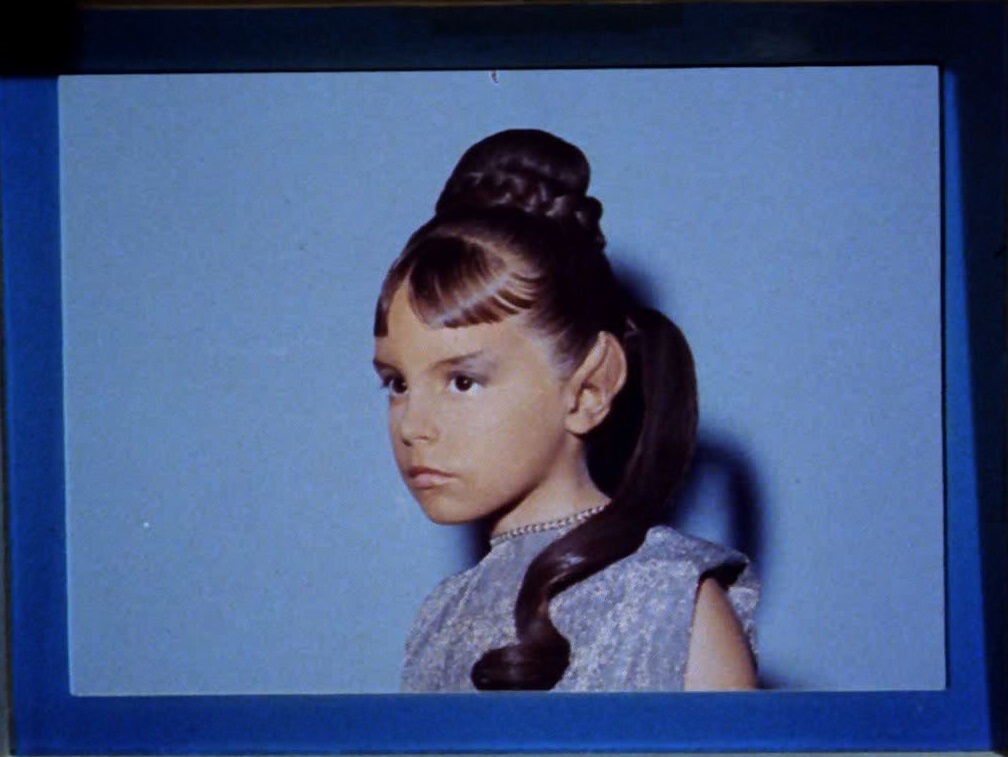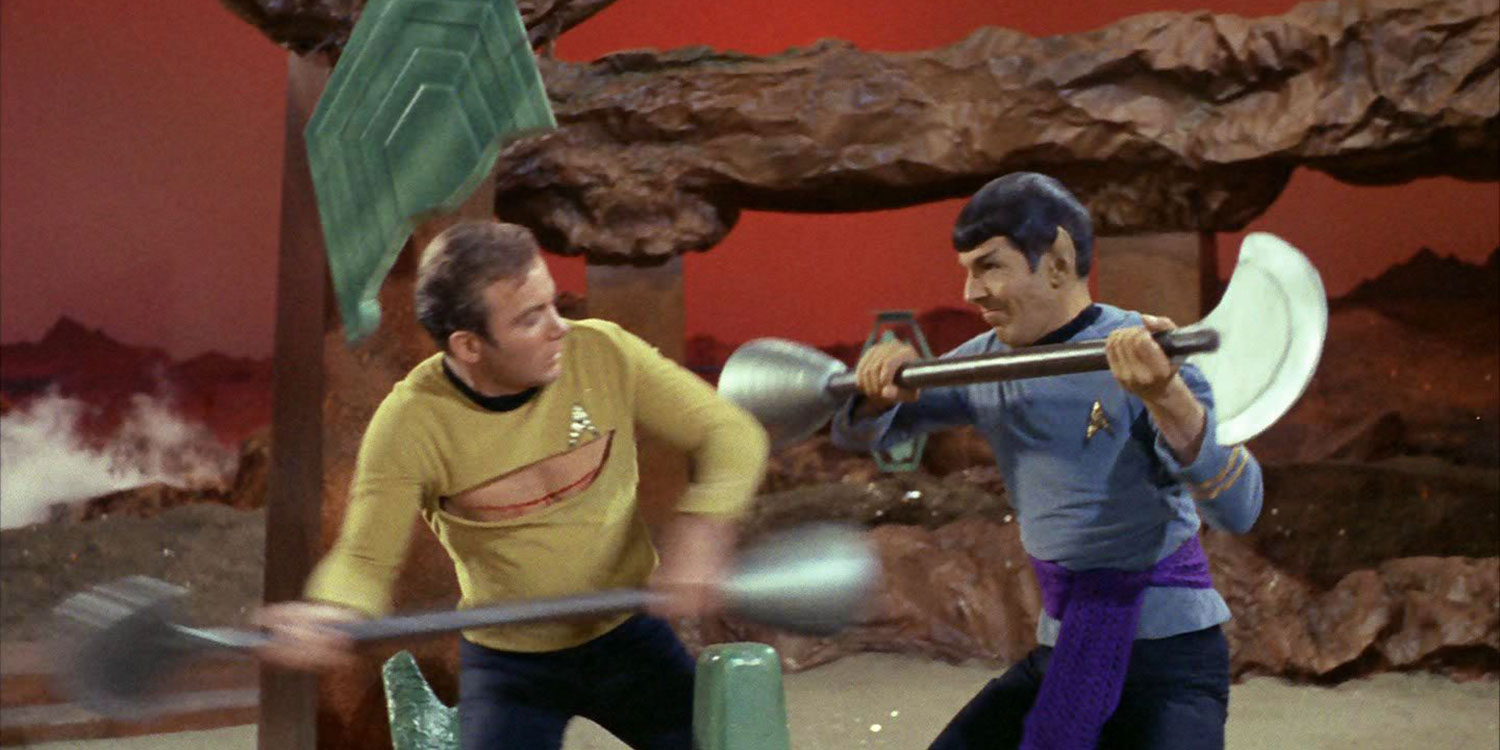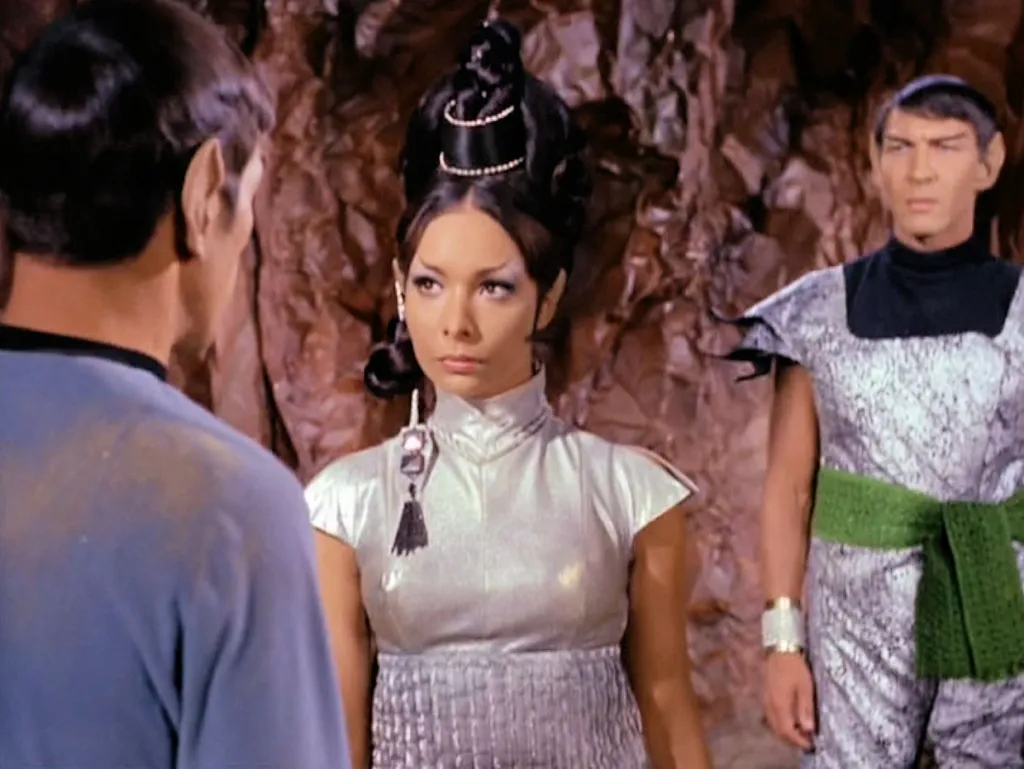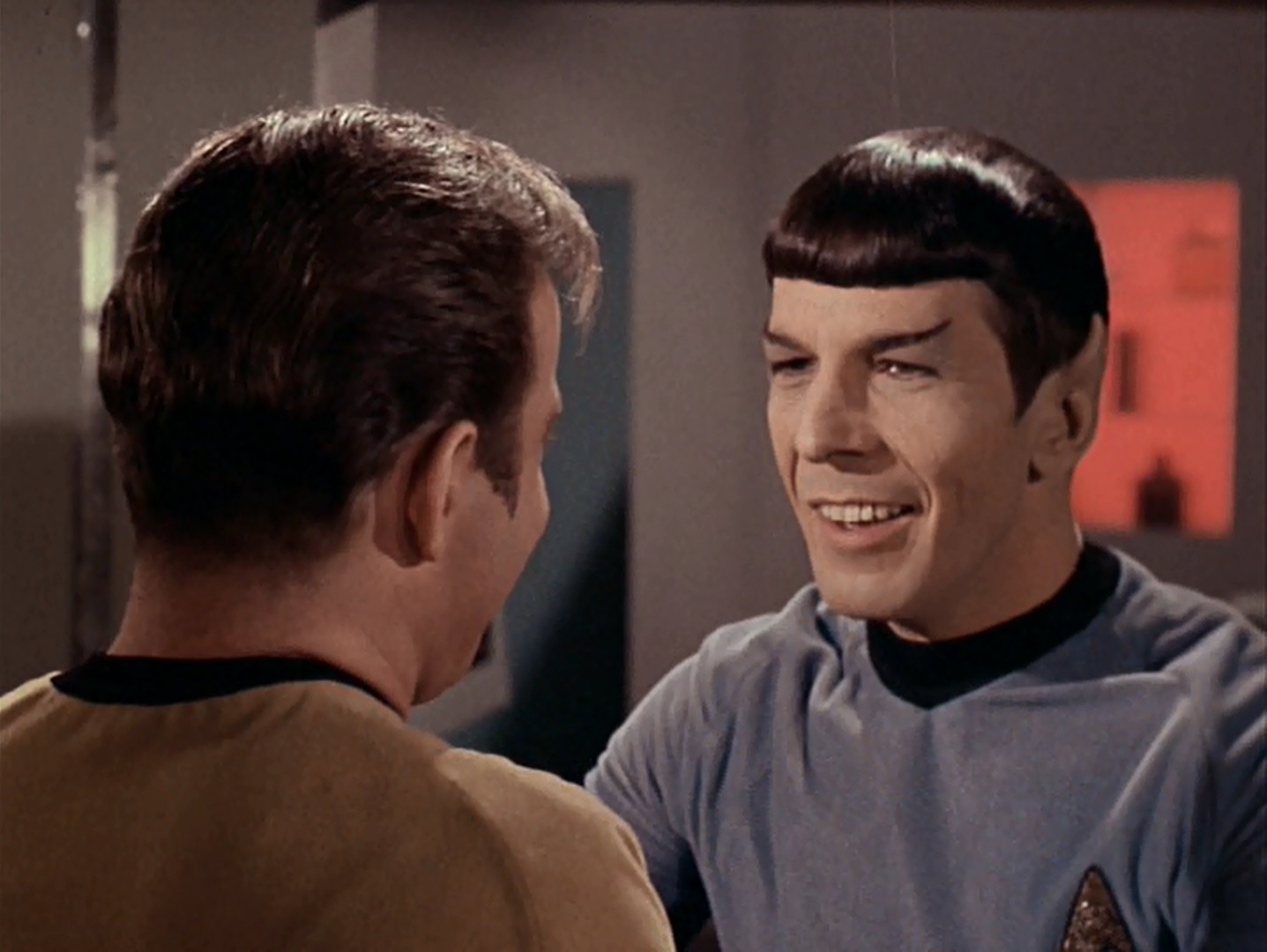
by Gideon Marcus
Back in the Starship Again
The Fall season of television is upon us again. Some shows from last season did not survive the chopping block: good riddance to Gilligan's Island and It's About Time, genuine tears for the loss of Green Hornet, and shrugs for Love on a Rooftop, Laredo, Occasional Wife, and like that.
One show got a genuine ending: Richard Kimball finally caught the one-armed man, and now he can live a normal life. At least, until The Invaders get him…

Notice how she keeps her pinky fingers just out of sight…
Other shows were renewed–from the stalwart Gunsmoke to the Mexican…er…African spectacle that is Tarzan. But let's face it. The program we were really waiting for was Star Trek, what Analog editor John Campbell called, "the first adult science fiction on television".
Would series star William Shatner make good on his threat to "put more of himself in the role"? Would new cast member Walter Koenig, as Ensign Chekov, be as endearing as the rest of the crew? After that dynamite, if not completely consistent, first season (not to mention a summer of reruns that held up remarkably well), would the second season knock our socks off?

I, for one, was not disappointed. Production pulled out all the stops, most notably with an entire new score provided by Gerald Fried (echoes of which can be heard in his scores for episodes of the 1966 spy show, The Man Who Never Was and in this week's debut episode of Mission: Impossible). Trek veteran, Joe Pevney, does a commendable job with directing, particularly in the scenes set on Vulcan, Dutch angles conveying the temporary madness of Mr. Spock. Mainstream science fiction once again contributes a script, this time from the pen of the illustrious Ted Sturgeon.
Chekov does not have many lines with which to distinguish himself, but his repartee with Mr. Sulu is engaging. As for Shatner, well, he definitely brings a few more personal tics to his portrayal of Captain Kirk. It's a bit more broad, more punctuated a performance. But he's still enjoyable to watch, convincing in the role.

"So, how did you enjoy working with Mike, Mickey, and Peter?"
That's the technical aspects. What about the episode itself? For that, I'll turn to my esteemed colleagues on the panel…
Ancient Rituals and Alien Biology

by Erica Frank
The episode begins with McCoy telling Kirk his first officer has a problem: he's been restless, avoiding meals. Kirk doesn't believe it; Spock is probably just meditating and wishes to avoid human contact. Then they see nurse Chapel ducking away from Spock's quarters as Spock throws a bowl of plomeek soup at her.
Spock is angry enough to be violent. This is shocking to everyone — Chapel, McCoy, Kirk, and the audience.
Has he been dosed with some kind of drug? Perhaps he was exposed to a natural hallucinogen that had the reverse effect of the pollen in This Side of Paradise — one that made him angry instead of happy.
No, he hasn't been drugged; his body is turning against him. The Vulcan mating drive will kill Spock if he doesn't get to his betrothed on Vulcan, with whom he was mind-bonded when they were seven years old.

Young T'Pring, looking every bit as serious as we expect a Vulcan child to be.
Kirk and McCoy accompany him to the ceremony, the Koon-ut-kal-if-fee. When they arrive, they get a shock: T'Pring demands that Spock win her in combat according to the ancient Vulcan rites.
Spock has no choice. He is deep in the plak tow, the blood fever; he must fight for her or die. T'Pring, accompanied by Stonn, chooses Kirk as her champion! Spock objects, but the officiating matriarch T'Pau simply asks, "Art thee Vulcan or art thee human?"
"I burn, T'Pau," he answers. "My eyes are flame. My heart is flame." He may not like T'Pring's choice, but if he cannot walk away, he cannot deny her.
Kirk accepts, figuring he'll roll with the punches, fall down, and leave Spock to his bride. After he agrees to fight, T'Pau informs him that this fight is to the death.

They fight with lirpa, a Vulcan weapon. Kirk, of course, manages to get his shirt torn.
After they disarm each other, McCoy treats Kirk with tri-ox, intended to counter Vulcan's thin air and heat, to make him closer to Spock's equal. They switch to ahn woon, a weighted long belt, and Spock uses his to capture and strangle Kirk… to death.
With Kirk's death, the blood fever fades, and Spock is once more his rational self. Before they leave, he insists that T'Pring explain her choice.
Spock, she says, has become a legend, and she does not wish to marry a legend. She wants Stonn. Kirk does not want her; if Kirk won, he would leave her to Stonn. If Spock won, they would wed… and he would leave, and she would still have Stonn.

T'Pring coldly explains why she made Spock fight his best friend instead of her chosen.
I think T'Pring has vastly underestimated Kirk's potential for spite. If he “won” her by killing Spock, he might haul her in front of a Federation tribunal for arranging the death of a Starfleet officer. He certainly wouldn't leave her to enjoy her boyfriend.
McCoy asks Spock for his orders, since he's in charge now. (I have trouble believing this; if a first officer kills his captain, he just takes over?) They beam back to the Enterprise, where Spock makes plans to resign and turn himself in.
Kirk comes out of sickbay to interrupt him. Apparently, McCoy actually dosed Kirk with something that simulates death. Everyone is fine, and now they can get back to their diplomatic mission.

Spock is overjoyed to see him alive. Because Starfleet needs good captains, of course. Not because it matters to him personally.
Color me unconvinced. What kind of "mate or die" drive vanishes if the one driven defeats his opponent? Why lose interest upon winning? I can only imagine that Spock's use of the mind-meld technique with various humans and aliens has weakened his bond with T'Pring, and that the shock of losing his dear friend completely erased whatever remaining mental bond he had with her.
That quibble aside, this really was fine stuff. "Amok Time" was perhaps the first true Star Trek episode, rather than a random science-fiction story with Trek characters. It built on what we know about the universe and the crew, and showed us a challenge that only they could face—which they resolved in a way that only they would.
Five stars.
The Birds and the Bees are not Vulcan

by Andrea Castaneda
It’s something to behold: a stoic man in his most vulnerable state. For the first time in the series (at least, without the interference of a spore or mickeyed water), the audience sees Spock’s steely veneer crack. He dashes soup across the room, verbally accosts his crewmates, and even undermines his captain’s orders. Yet his insubordination is revealed to come from a great source of anguish for the Vulcan. The anguish from having to suppress a biological drive, and being unable to tell anyone about it.
Now, I am no Vulcan. My blood does not “burn” and I am not compelled to return to my birthplace to spawn. But the fear, shame, and guilt he experiences– for something he has no control over– was something that deeply resonated with me, especially in my teenage years.
I’ll spare you the details, but my "birds and the bees talk" was nothing short of excruciating. “Don’t do this,” and “don’t do that”, lest you will be seen as a fallen woman. Any further questions I had regarding such an “uncouth” topic were treated with either avoidance, reluctance, or disgust. I shan't disclose how I cope with my nature now, as it is– to quote the vulcan– “a deeply personal thing”. However, what I will say is that my parents' fumbling attempts at sex-ed negatively impacted me growing up. It taught me to never speak up about “shameful” things, which in turn led me astray in many situations. I am relieved to see today’s youth has become more open and matter-of-fact regarding such topics. But there are still many who wish to hide behind old attitudes. Like the Vulcans, who seem partial to the same provincial mindset of my grandmother. I understand that there can be “logic” in knowing when to be prudent about such things. But considering how their biology can prove lethal when untreated, both to themselves and to others, where is the logic in choosing to avoid this topic altogether?

T’Pau explains nothing to Kirk before handing him a blade and telling him to fight his best friend.
The way I see it, regarding both the Vulcans and us humans, it is an exercise in futility. We want to feel safe and secure, and the only assured way to do so is to master nature and our own bodies. But it is hubris to think that a strong enough will can override mother nature. Our bodies will fail us, in one way or another. And the only way to conquer that fear is to confront it head on. The way to start is to name what ails us.
Of course, Vulcans and the world of Star Trek are not real but rather created by our human men– and at least one woman– here on earth. This epsiode leaves me asking why the writers, who wish to portray an idealized future, still feel that discussing sex is a terrifying prospect? [q.v. "Charlie X" (Ed.)]
Still, apart from my quandaries, this episode delivered a compelling story. It included wonderful details that upped the stakes, gave us a look into the enigmatic Vulcan culture and the politics of the federation. Season two starts by hitting a home run and I sincerely hope it continues this momentum.
Five stars.
POST-MODERN LOVE

by Joe Reid
Something old.
Something new.
Ritual combat.
Something blue.
Most of these are considered tokens of good luck. The illogical creatures that we humans are, we rely on good luck charms, because of all the lying, trickery, bribery, and violence that we employ to convince other people to marry us doesn’t seem to be enough to make our unions last. According to the U.S. Department of Health, Education, and Welfare, last year (1966) there were 1,857,000 U.S. marriages. The same year 499,000 divorces happened. The number of divorces for last year is 26% of the number of marriages. With tallies like these, it’s obvious that we need help.
Along came the exciting first episode of the 2nd season of Star Trek to show us how beings who value logic and reason engage in the act of marriage. How, you ask? They do it with lying and trickery, and of course, violence.
“Amok Time” is the name of this week’s episode of Star Trek. I want to start off by saying that it was splendid looking! From the futuristic space outfits to the details in the props. I was flown off to another world!

Silver future fashion
The show starts out with the Vulcanian (or Vulcan), Mr. Spock, behaving in a “most illogical” way. He acts like a brute, breaking dishes and yelling at everyone. Even Captain Kirk gets an ear full. Through the course of the tale, we learn that Mr. Spock lost all his logic and control because of a Vulcan biological stage which causes him to burn with desire. For what? The same thing that the men of our day desire. A girl. Our calm and honest Mr. Spock becomes loud and irate. His indiscretions extend to lying to the new Russian kid to send the Enterprise to Spock’s home planet of Vulcan. He lies so badly that he doesn’t even remember that he lied! How many of today’s guys and gal’s tell zingers to friends, family, each other and even priests, to get to that someone they desire the most?
We then witness Spock, Kirk, and Dr. McCoy on Vulcan, where we see a bridal party with a wise matronly leader. Also Spock’s soon to be wife, T’Pring, and a bunch of big soldier types that are guards. One thing stood out to me during this scene. “Why isn’t the girl that Spock is supposedly marrying carrying on the same way that he is?”, I wondered. She was as placid as still waters. We all know what they say about still waters, and it isn’t long until we are shown the depths of trickery that T’Pring is willing to sink to.
We’ve all heard stories of friends who come to blows over a girl. So why and how would people in an advanced future society based on reason and logic descend to fisticuffs over a female? Why? Because she wanted them to. She manipulated friends to fight, not because she loved one of them, but because she didn’t love either of them, and it served her true purpose to have one eliminated. In the end we learned that even though Spock was driven insane with passion for T’Pring, she didn’t want him at all. She went through all the pomp and circumstance just to create a situation where she wouldn’t have to be with Spock. Even if it cost him or Kirk their lives. Which it just might have.
So, what is the current day parallel of T’Pring’s trickery? From Cleopatra to Mata Hari, some ladies have only wanted a man that they can control. Even today they are willing to say and do anything to get that. “Amok Time” showed a wife that was willing to destroy Spock to get Stonn. A shell of a man that she can lead.

T’Pring rejects Spock.
One of the reasons that I find Star Trek so special is because, even though it takes us to strange new worlds, at the end of the day what we find on those worlds is ourselves reflected back at us. The situations in this episode were barely exaggerated reflections of the kind of people that we are and become when engaging in modern love.
5 stars
A Queer Episode

by Jessica Dickinson Goodman
This is perhaps my favorite episode of Star Trek so far; as Erica says, it may also be the first truly Star Trek episode of the series. A braided narrative of complex alien marriages, fraught male friendships, and taboo-filled – and taboo-breaking – reproductive rituals? Sign me up.
Last Spring, I reviewed a CBS "documentary" called "The Homosexuals," , noting that "There is something profoundly queer in enjoying science fiction and fantasy." I found this episode delightfully queer (meaning "odd" or "unusual", of course), each strand of the narrative challenging norms and assumptions in different ways.
The first queer thread in the episode was the Vulcan concept of marriage, starting with a wedding ritual that Spock says is "Less than a marriage but more than a betrothal." It is an in-between thing, this ritual we see, with some of the romantic declarations one might find at a regular church wedding, but also some theatrics and roles that have no analog to American marriage customs. One thing which stuck out to me was the queerness of the officiant, if we can call T'Pau that, being a woman. Sure, in Sweden and Norway, there are women conducting marriages, as well as in a precious few Presbyterian and Baptist churches (I have not heard of any women rabbis or imams, but I am open to correction). But amongst the more high-church, smells-and-bells Christian denominations, even the fairly open-minded Episcopal Church isn't allowing women further than the deaconate (and that is being debated today at General Convention LXII in Seattle; one hopes for more progress on that front). As it stands, a woman overseeing a highly formal wedding is pretty science fictional for most viewers.

The second queer thread was the intense relationships between Spock, Kirk, and McCoy. In a short television set hour, we saw these men throw themselves at each other; violate orders; disregard medical protocol; lie to diplomats of an allied planet to protect each other; fight to insert each other into the sacred rituals of a secretive culture; and lest we forget, roll around in the dirt ripping their clothes up. In our world, I see men often forced into stoicism, criticized for exhibiting any strong emotions other than anger (or perhaps enthusiasm for sports), for getting too involved as a father, for expressing affection toward each other. In that context, it was a balm to see Spock's beatific smile at Kirk's survival, McCoy's tenderness and protectiveness towards Kirk's "dead" body, or Spock's simple but powerful defense of his friends: "They are not outworlders. They are my friends. I am permitted this." One might hope for a day when all people are "permitted" this.

The third queer thread was the deeply taboo – to Spock at least – topic of Vulcan reproduction. As Andrea points out, the conversation between Kirk and Spock on this topic is deeply, and to me comically, awkward. But it also lit my imagination on fire, like all good science fiction and fantasy does. What does Spock mean when he analogizes his species' form of reproduction to spawning salmon? Is it just the traveling aspect, or does he have some kind of roe sacks hidden under his greenish-skin? And what does it mean for an entire society of beings who prize emotionlessness, and call it "logic" , to have every single member of it engage in a "time of mating" which is a "madness which rips away our veneer of civilisation"? It is queer both because this approach to reproduction exists at an oblique angle to our own human conceptions of it, but also because it deeply challenges our own assumptions about how other intelligent lifeforms might structure their societies, pick their bed fellows, and understand both their and our families and worlds.

A few of us here wrote stories, cocktail recipes, songs, articles, games, and drew art for a summer fanzine Gideon organized called The Tricorder, touching on the strange and wonderful worlds that Season 1 of Star Trek had given us to play in. With all of these new, queer threads to unwind and reknit into new creations, I can't wait to see where Tricorder #2 might take us.
Five stars.
Speaking of Star Trek, it's on TONIGHT! By all the Ghods, it looks like an interesting one…

Here's the invitation!
Also, copies of The Tricorder are still available — drop us a line for details!







![[July 8, 1968] Let the Sunshine In (<i>Hair: The American Tribal Love-Rock Musical</i>)](https://i0.wp.com/galacticjourney.org/wordpress/wp-content/uploads/2023/07/680708_HairAlbum.jpg?resize=600%2C372)

![[June 18, 1968] I Just Read It for the Stories (February-June 1968 <i>Playboy</i>)](https://i0.wp.com/galacticjourney.org/wordpress/wp-content/uploads/2023/06/680618_PBCvrMarch.png?resize=672%2C372)







![[March 14, 1968] Bugs in the machine (<i>Star Trek</i>: "The Ultimate Computer")](https://i0.wp.com/galacticjourney.org/wordpress/wp-content/uploads/2023/03/680314title1.jpg?resize=672%2C372)










![[February 28, 1968] Zero for the Price of Two (<i>Star Trek</i>: "By Any Other Name")](https://i0.wp.com/galacticjourney.org/wordpress/wp-content/uploads/2023/02/680228title.jpg?resize=672%2C372)
























![[October 12, 1967] See you on the flip side (<i>Star Trek</i>: "Mirror, Mirror")](https://i0.wp.com/galacticjourney.org/wordpress/wp-content/uploads/2022/10/671012title.jpg?resize=672%2C372)














![[September 22, 1967] (<i>Star Trek</i>: "Amok Time")](https://i0.wp.com/galacticjourney.org/wordpress/wp-content/uploads/2022/09/670922title.jpg?resize=672%2C372)















![[April 20, 1967] End of the Road (<i>Star Trek</i>: "Operation: Annihilate!")](https://i0.wp.com/galacticjourney.org/wordpress/wp-content/uploads/2022/04/670420title.jpg?resize=672%2C372)














![[April 12, 1967] We'll take Manhattan (<i>Star Trek</i>: "The City on the Edge of Forever")](https://i0.wp.com/galacticjourney.org/wordpress/wp-content/uploads/2022/04/670412title.jpg?resize=672%2C372)

















![[March 8, 1967] Absolute perfection (<i>Star Trek</i>: "This Side of Paradise")](https://i0.wp.com/galacticjourney.org/wordpress/wp-content/uploads/2022/03/670308title.jpg?resize=672%2C372)

















